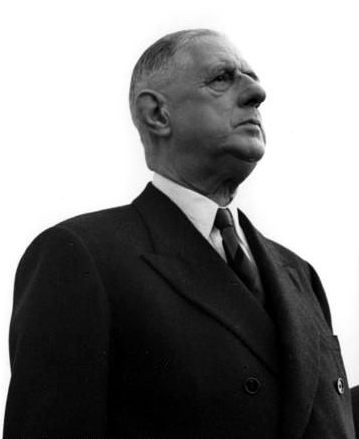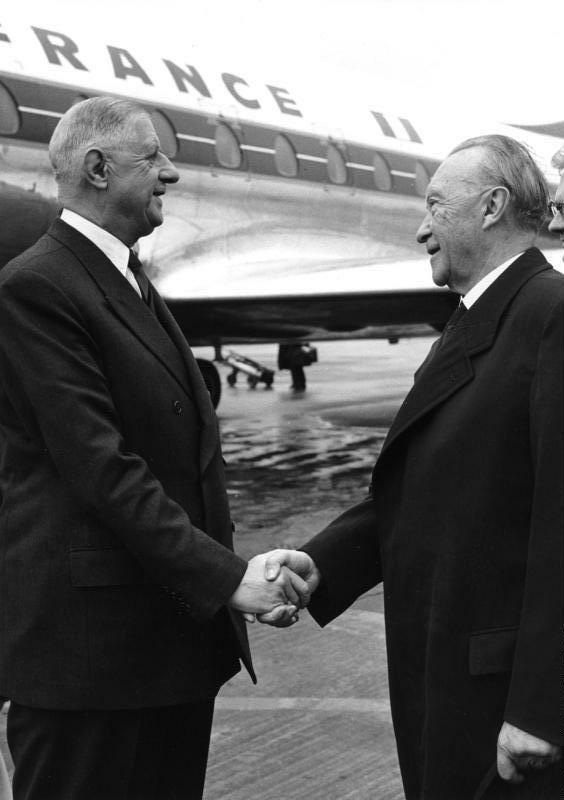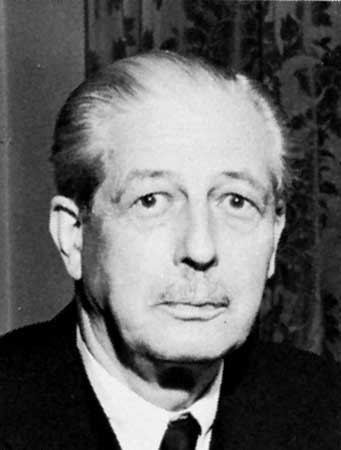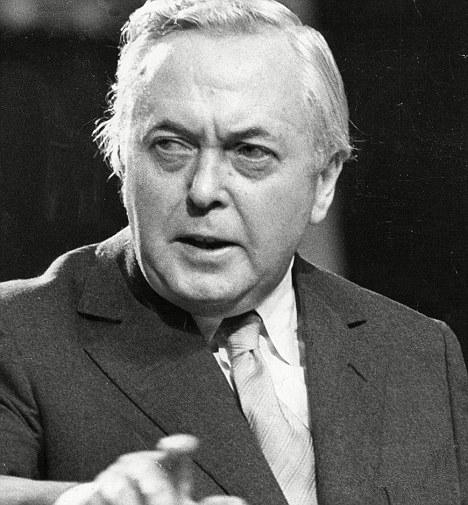19. THE SETTLING IN OF THE COLD WAR


DE GAULLE VS. THE ANGLO WORLD
 The background of de Gaulle's
The background of de Gaulle'ssentiments about the Anglo world
 De Gaulle's problems with the rest of
De Gaulle's problems with the rest of
Europe
 De Gaulle tries to undercut American-led
De Gaulle tries to undercut American-led
NATO
The textual material on page below is drawn directly from my work
A Moral History of Western Society © 2024, Volume Two, pages 307-308.
THE BACKGROUND OF DE GAULLE'S SENTIMENTS ABOUT THE ANGLO WORLD |
| [This first section is not part of the written text] Johnson was so completely caught up in the challenge of his war in Vietnam that diplomatic interests and issues elsewhere in the world tended to be pushed aside. This certainly was the case in Europe. And because of this grand American distraction caused by the Vietnam War, French President Charles de Gaulle saw a grand opportunity to finally pull Europe away from its dependency on American protection, and bring Europe under the more traditional lead of France, or, more precisely, under the leadership of de Gaulle himself. The personal ambitions of de Gaulle had provided a regular dose of annoyance to France's allies as far back as World War Two (but what egotistical generals had not themselves been a pain to deal with in an alliance that required close cooperation in order to defeat the Germans?) Certainly de Gaulle had been the loudest of the few French leaders who in 1940 had not decided simply to surrender to the Germans, hoping for the best deal possible under German occupation (sort of a reversal of the Versailles Treaty arrangement that followed World War One when Germany got placed under the direction of its former enemies). De Gaulle would have none of that. But he also did not have much to work with. The French army and navy had come under the authority of the Vichy Government, and so de Gaulle at first actually commanded very little. Yet his French voice would prove very useful to England and America when it was time to get the French "Resistance" fighters moving in support of the Allied offensive across France in pursuit of a retreating Nazi army in 1944. But the cost of letting de Gaulle take the lead (such as leading the victory parade through Paris, as if it had been de Gaulle's troops themselves that had liberated their own capital city) would prove to be great. Other French generals had actually been much more useful in coordinating French military efforts with the American and British allies. But the name "de Gaulle" was better known (the British had let him deliver encouraging broadcasts beamed weekly to France in the time period prior to the Allied invasion of France itself). And thus it was that de Gaulle came simply to see himself as the voice (and conscience) of France – all of France. As a devoted Catholic, de Gaulle was fervently anti-Communist, which also made him very useful to Roosevelt, who (along with Churchill) was quite concerned about how the large French Communist party, through its belated involvement in the French Resistance, might move to take control of France in all the confusion of 1944-45, and the potential post-war period. Personally, Roosevelt detested de Gaulle and kept him away from the big-power conferences (such as Teheran and Yalta) held among the "Big Three" of Roosevelt, Churchill and Stalin. This hurt de Gaulle's immense ego, so much so that he developed a very bitter attitude towards the Anglo-Saxons (Britain and America) that would remain with him for the rest of his life. And therein lay a big part of the problem that de Gaulle would bring to American-European relations. This would develop not only immediately after the war, but even more so during the 1960s when de Gaulle was French President, and on a huge anti-Anglo-Saxon political-cultural campaign. During the Truman and Eisenhower years, America had been not only highly supportive of but even rather insistent upon America's allies in Europe putting their nationalist differences aside and start working closely together, largely as a matter of defense against expansive Communism. Thus the NATO military alliance had been birthed in 1949. But the matter went well-beyond military strategy. Closer "economic integration" had been pushed by America, in making the dollar freely interchangeable with all European currencies, and then also in encouraging the integration of Europe's strategic industries of coal and steel production (the European Coal and Steel Community set up in 1952), and eventually the birthing of a more comprehensive economic integration through the European Economic Community (EEC) brought together in 1957 by way of the Treaty of Rome. |

DE GAULLE'S PROBLEMS WITH THE REST OF EUROPE |
| Seeing
Johnson's America so caught up in the Vietnam crisis, de Gaulle
realized that he had a grand opportunity to pull Europe away from its
dependence on America … and instead bring his fellow European nations
under French leadership – especially in the realm of military affairs. In general, de Gaulle was not pleased with European integration and its attempt to move Europe beyond its national self-interest (the cause of two horrible world wars in the 20th century alone) by bringing Europe under some kind of bureaucratically united all-European government. Instead, he supported the idea simply of a well-administered diplomatic program uniting the various fully-sovereign European nations … a program, however, that excluded the Anglo world of America and Britain that he despised so much. He particularly resented the role that NATO played in Europe … even despite the fact that NATO's operational headquarters were based in France. For de Gaulle, NATO involved way too much American intrusion into Europe's affairs. Thus soon after arriving in power, the following year (1959) he took France's Mediterranean naval fleet out of NATO command. At the same time, he also demanded that the Americans and British remove all of their nuclear weapons from France … supposedly leaving only France's nuclear "Force de Frappe" to counterbalance the Soviet nuclear position in Europe. De Gaulle also worked hard to bring German Chancellor Konrad Adenauer (German leader, 1949-1963) on board with his program of pushing America out of Europe. Certainly Adenauer and de Gaulle were friendly colleagues. But it soon became clear that Adenauer had no interest in exchanging American protection with French protection … not if he hoped to keep a very aggressive Soviet Empire from attempting to extend its grip into West Germany. French power was not a serious alternative to American power. And at the same time, de Gaulle used French authority to block in 1963 Britain's efforts finally to join the European Common Market … vetoing Prime Minister's Macmillan's British application and leaving an embarrassed Britain out in the cold. He was finally getting his revenge for having been excluded from the Big Power triumvirate of Roosevelt, Stalin and Churchill during World War Two. |
 De Gaulle and Adenauer (July
18, 1961)
De Gaulle and Adenauer (July
18, 1961)

Harold Macmillan - Conservative
(Tory) Party leader and British Prime Minister (1957-1963)
| He brought Britain into an alternate economic alliance, the European Free Trade Association (EFTA) of the "Outer Seven" – Britain, Denmark, Norway, Sweden, Portugal, Switzerland and Austria. But this union proved to be less beneficial than the EEC ...and most of the members eventually switched their affiliation to the EEC. |

Harold Wilson - Labour Party
leader and British Prime Minister (1964-1970 and 1974-1976). He would be a strong supporter of the idea of Britain joining the EEC
DE GAULLE TRIES TO UNDERCUT AMERICAN-LED NATO |
| That
same year he also made another move against NATO, withdrawing France's
much more strategically important Atlantic fleet from NATO … hoping
that other NATO members would do the same. None did. Also in grand defiance to America (now led by Johnson) in 1964 de Gaulle broke from the anti-Communist alliance supporting Taiwan's Nationalist Government and opposing Mao's regime … instead, terminating French recognition of the Taiwan government and extending full diplomatic recognition to Mao's Chinese government in Beijing. He also made a trip to Moscow that same year … reportedly restoring France's traditional and quite close relationship with Russia. He even posed France as neutral in the Cold War … referring to the Soviet Union simply as "Russia," purposely ignoring the ideological differences separating Soviet Russia from Gaullist France. Then to add further insult to America, he traveled to Latin America … to taunt America's southern neighbors for having allowed themselves to fall under American political and economic domination. In February of 1965 he attacked even more directly Johnson's America by demanding the exchange of the dollar reserves held by France for America's gold reserves … hoping that other nations would follow, thereby bringing down the international status of the dollar – and the American economy itself. No other nation followed his lead. Nonetheless it was a grand humiliation for America to have the French navy come to America to take away its share of America's gold reserves. That same year he then pulled France out of SEATO (the Southeast Asia Treaty Organization) that had been formed in 1955 as an anti-Communist follow-up to the Korean War and the French withdrawal from Indochina. But again, none of the other members (Britain, Australia, New Zealand, the Philippines, Thailand, Pakistan … and America of course) followed de Gaulle's lead. Finally in 1966 de Gaulle made his biggest strike against the American-led West when he demanded that all NATO troops be removed from France.1 His order did not include the NATO civilian staff located in France … but they too sensed that humiliation would be soon coming their way – and simply moved their offices to Belgium, just south of Brussels … where with the EEC's headquarters also located in Brussels, ended up making Brussels something of Europe's new administrative center! De Gaulle meanwhile indicated that France would remain part of the North Atlantic Treaty … but just not its organization NATO. Certainly all this behavior turned many of the French into fervently anti-Anglo nationalists – as de Gaulle fully intended. But as he would soon find out, not every Frenchman was sold on de Gaulle's supposed importance to France ... and its new anti-Anglo identity. 1American Secretary of State Dean Rusk sarcastically asked de Gaulle: did this order to evacuate all U.S. troops from France include the 50,000 American war dead buried in French cemeteries?  Go on to the next section: The Arab-Israeli Six-Day War
 |